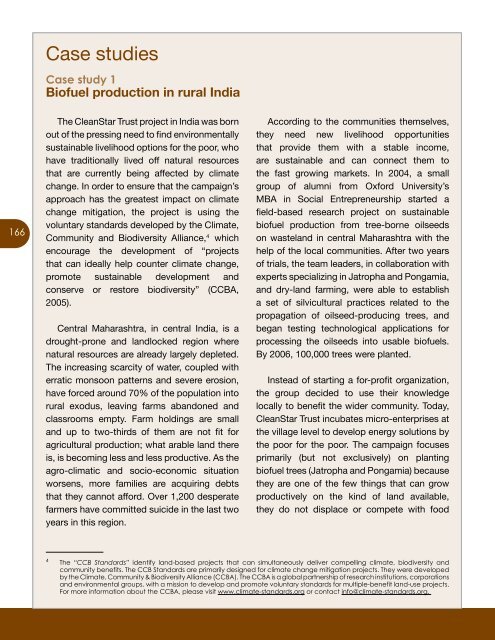GGCA Gender and Climate Change Training Manual - Women's ...
GGCA Gender and Climate Change Training Manual - Women's ...
GGCA Gender and Climate Change Training Manual - Women's ...
Create successful ePaper yourself
Turn your PDF publications into a flip-book with our unique Google optimized e-Paper software.
Case studies<br />
Case study 1<br />
Biofuel production in rural India<br />
166<br />
The CleanStar Trust project in India was born<br />
out of the pressing need to find environmentally<br />
sustainable livelihood options for the poor, who<br />
have traditionally lived off natural resources<br />
that are currently being affected by climate<br />
change. In order to ensure that the campaign’s<br />
approach has the greatest impact on climate<br />
change mitigation, the project is using the<br />
voluntary st<strong>and</strong>ards developed by the <strong>Climate</strong>,<br />
Community <strong>and</strong> Biodiversity Alliance, 4 which<br />
encourage the development of “projects<br />
that can ideally help counter climate change,<br />
promote sustainable development <strong>and</strong><br />
conserve or restore biodiversity” (CCBA,<br />
2005).<br />
Central Maharashtra, in central India, is a<br />
drought-prone <strong>and</strong> l<strong>and</strong>locked region where<br />
natural resources are already largely depleted.<br />
The increasing scarcity of water, coupled with<br />
erratic monsoon patterns <strong>and</strong> severe erosion,<br />
have forced around 70% of the population into<br />
rural exodus, leaving farms ab<strong>and</strong>oned <strong>and</strong><br />
classrooms empty. Farm holdings are small<br />
<strong>and</strong> up to two-thirds of them are not fit for<br />
agricultural production; what arable l<strong>and</strong> there<br />
is, is becoming less <strong>and</strong> less productive. As the<br />
agro-climatic <strong>and</strong> socio-economic situation<br />
worsens, more families are acquiring debts<br />
that they cannot afford. Over 1,200 desperate<br />
farmers have committed suicide in the last two<br />
years in this region.<br />
According to the communities themselves,<br />
they need new livelihood opportunities<br />
that provide them with a stable income,<br />
are sustainable <strong>and</strong> can connect them to<br />
the fast growing markets. In 2004, a small<br />
group of alumni from Oxford University’s<br />
MBA in Social Entrepreneurship started a<br />
field-based research project on sustainable<br />
biofuel production from tree-borne oilseeds<br />
on wastel<strong>and</strong> in central Maharashtra with the<br />
help of the local communities. After two years<br />
of trials, the team leaders, in collaboration with<br />
experts specializing in Jatropha <strong>and</strong> Pongamia,<br />
<strong>and</strong> dry-l<strong>and</strong> farming, were able to establish<br />
a set of silvicultural practices related to the<br />
propagation of oilseed-producing trees, <strong>and</strong><br />
began testing technological applications for<br />
processing the oilseeds into usable biofuels.<br />
By 2006, 100,000 trees were planted.<br />
Instead of starting a for-profit organization,<br />
the group decided to use their knowledge<br />
locally to benefit the wider community. Today,<br />
CleanStar Trust incubates micro-enterprises at<br />
the village level to develop energy solutions by<br />
the poor for the poor. The campaign focuses<br />
primarily (but not exclusively) on planting<br />
biofuel trees (Jatropha <strong>and</strong> Pongamia) because<br />
they are one of the few things that can grow<br />
productively on the kind of l<strong>and</strong> available,<br />
they do not displace or compete with food<br />
4<br />
The “CCB St<strong>and</strong>ards” identify l<strong>and</strong>-based projects that can simultaneously deliver compelling climate, biodiversity <strong>and</strong><br />
community benefits. The CCB St<strong>and</strong>ards are primarily designed for climate change mitigation projects. They were developed<br />
by the <strong>Climate</strong>, Community & Biodiversity Alliance (CCBA). The CCBA is a global partnership of research institutions, corporations<br />
<strong>and</strong> environmental groups, with a mission to develop <strong>and</strong> promote voluntary st<strong>and</strong>ards for multiple-benefit l<strong>and</strong>-use projects.<br />
For more information about the CCBA, please visit www.climate-st<strong>and</strong>ards.org or contact info@climate-st<strong>and</strong>ards.org.

















